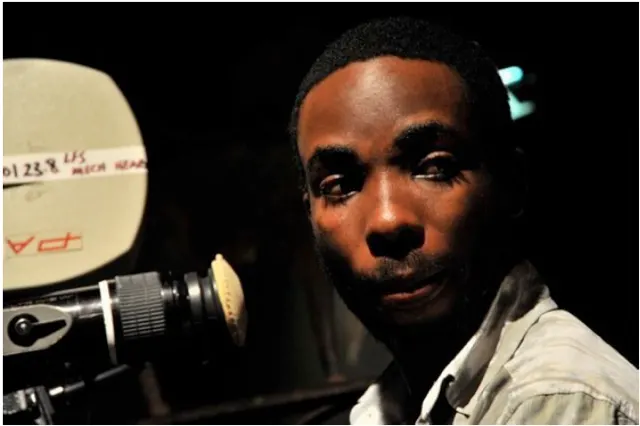Musings on African Film … Part Two
8 April 2015 | East Africa Travel | Michael Boyd

[Caption for main image: Ishaya Bako, award winning Nigerian filmmaker of Braids on a Bald Head]
Of all the film industries currently operating in Africa, there are three countries that stand out in particular.
Firstly, who hasn’t heard of Nollywood and seen Nollywood films for sale at markets all over the continent? You have, even if you don’t know you have. The Nigerian film industry, Nollywood, competes with Hollywood as the second or third biggest producer of films in the world (up to 1200 films each year) – after India’s Bollywood. It is also, perhaps, the most technologically successful cinema in the world; not in the production or special effects (where it may rate among the worst) but certainly in distribution and exhibition.
Nollywood grew out of television production of the 1960s, and came into being in the 1990s when producers realised that films could be made quickly and cheaply with small, hand-held cameras. The films could swiftly be transferred to video (later DVD) and sold in shops and markets. From there, everyone picked up a camera and the industry exploded. Nollywood has built its extraordinary success on the home video market – not the cinema, like Hollywood and Bollywood. In the internet age, streaming of Nollywood films is now also hugely popular, ensuring that the Nigerian diaspora around the world are hooked. The better known films (or series of films) are created in one week and upon release will sell between 150 000 – 200 000 copies in a single day. Last year, the film industry was estimated to be worth $5.1 billion.
It is nearly impossible to name the best of Nollywood – there are many websites that do. Titles such as The Figurine (2009) and Braids on a Bald Head (2010) are available. A few have even hit the international market, and the cinema, like The Mirror Boy (2011) and Maami (2010). However, the place to start is the film considered to be the first Nollywood film: Living in Bondage (1992). Made by Kenneth Nnebue, it is the film that pulled Nollywood out of the cinema and into the home cinema market.
Until recently Kenya had very little in the way of a film industry. It was the backdrop we know so well from Out of Africa (1985), and otherwise the country produced the odd documentary dedicated to the poverty of the people. However, in 2005, the Kenyan government established the Kenyan Film Commission, which is now doing many exciting things, and along with a number of media houses, is successfully growing a local film-going culture. Along with this, film schools have opened and more and more Kenyans are involved in the industry.
In terms of output, Kenya is far behind the leading African filmic countries – South Africa and Egypt – but in many ways can be seen as the most promising of Africa’s film industries, with some tremendous films being produced. One production house in particular must be mentioned for the quality of its films: One Fine Day Films. With its tagline, ‘Supporting New African Cinema’, that is exactly what German co-founder Tom Tykwer, has done. While offering his expertise, contacts and experience, he leaves the films to be produced in workshops where they are made by capable local talent. Although only four films have been produced by One Fine Day so far, one has already been nominated for the Best Foreign Language Academy Award – the mighty Nairobi Half-Life (2011). If you want an introduction to Kenyan cinema, any of the One Fine Day productions is the best start: Soul Boy (2010), Nairobi Half-Life (2011), Something Necessary (2013) and Veve (2014).
Postscript: Please refer to Part One of this post for details (and a reminder to read it just in case you missed it last time around).


